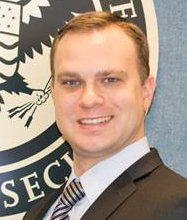How I Lead: I See Opportunities Everywhere
A conversation with DHS procurement executive Jeff Bardwell.
Jeff Bardwell, executive strategic communications liaison at the Homeland Security Department’s Office of the Chief Procurement Officer, juggles many roles. He manages the office’s internal and external communications; advises senior leaders on industry, public and legislative affairs; and serves as liaison between government and industry on DHS’ annual $16.5 billion acquisition portfolio.
How did you get to where you are today?
Extrinsically, I have had the support of many people. Intrinsically, I have passion for my work. My favorite quote, by E.M. Forster, is “one person with passion is better than 40 people merely interested.” I started out doing operational procurement–contracts–which no one thinks is a sexy job at DHS, but it is extremely important to our mission. I approached the job with passionate interest, gave it my all, and excelled. From this experience I developed business skills and a positive reputation that got me recruited by the Office of the Chief Procurement Officer to do strategic communications related to procurement.
What do you do after work for fun or to relax?
I play rugby. There is something cathartic about knocking over other adult men and being knocked over by them in turn. It’s humbling really. Playing rugby motivates me to stay in shape, though I’m not sure how healthy it really is, given the occasional injuries I sustain. Recently, I had an epic black eye that got a lot of attention at work.
What is the best mistake you've ever made?
I remember walking into my new office environment when I started with DHS. I feared growing into a curmudgeonly old bureaucrat in there, counting the days until retirement. I wondered if I was making a mistake. But it turned out that my work was so interesting and challenging that I quickly dismissed such a notion.
What strengths do you bring your organization?
I am fortunate to be a participant in DHS NextGen, a leadership development program. Through this program I recently had the opportunity to take the Strengths Finder Assessment. The findings suggest, in short, that I relate to people well, I consider many variables when making decisions, I have vision, I want to succeed and I like to turn thoughts into action. It’s not me saying that, it’s science! With this awareness, I have been able to leverage my strengths to make significant improvements in the communications processes of my office. These improvements directly and indirectly improve our relationships with our workforce, our components, Congress, oversight agencies, department leaders and other stakeholders.
What is your strategy for interactions with your supervisor?
I remain conscious of my role as a subordinate. In no way does that suggest I am overly deferential or overly formal. It suggests that I feel a duty to give my input, sometimes in a spirited manner. But when it is time to make a decision, I let the person who is accountable make the decision. If it is a lawful and ethical decision, I support it, even if I disagree. I believe that it is just as important for me to support my supervisors as it is for them to support me.
What career accomplishment are you most proud of and why?

I am most proud of finishing graduate school. I got lucky with budget timing and DHS paid for my graduate program while I worked. I made a lot of sacrifices while studying. For four years it felt like I did little besides work and school. But I knew it would be worth it, and it has been. I now have the well‑rounded education I need to move forward in my career.
What is your latest goal or ambition?
I want to join the Senior Executive Service. The Partnership for Public Service recently produced an interesting report that, among other things, suggested that there should be two tracks for senior leadership: one for technical experts and one for generalist leaders. Senior executives with these different skill sets would be identified and would be aligned in a complementary manner. I think there is something to this idea. I’m more of a generalist leader naturally, though I highly value technical skills and personally work to sharpen them.
What is the most important thing you have learned in your career?
I have learned that there are two kinds of people: those to whom opportunities happen and those who happen to opportunities. I prefer to happen to my opportunities. I always advise junior staff that they can distinguish themselves by keeping an eye out for opportunities, preparing for them, making their interest known and following through. The best opportunities rarely fall into your lap. I see opportunities everywhere. I wish I could transfer that proclivity to people who think they are in a rut.
Tell me something your co-workers do not know about you.
I started my education at community college while working full time in a blue-collar job. I never thought I would be where I am, and I do not take it for granted that I am here.
What was the biggest career risk you took?
Long ago, I decided to leave a job that paid well but had a very limited future in order to finish my undergraduate degree, with hopes of one day obtaining a more fulfilling job with growth potential. In retrospect, it was among the best decisions that I have ever made, but at the time I had no guarantee that it would pay off. Indeed, for many people it does not pay off. It sounds cliché, but I learned that nothing worth having comes easy, or without risk.
What motivates you?
I am motivated by opportunities to excel in public service, especially on occasions when my work directly or indirectly supports our workforce.
NEXT STORY: Wanted: More Docs and Nurses at VA








